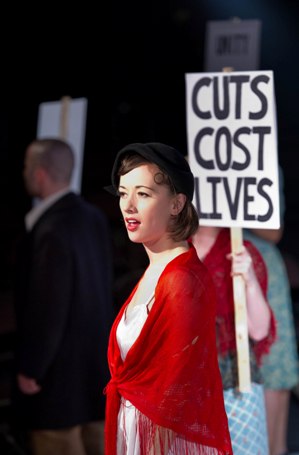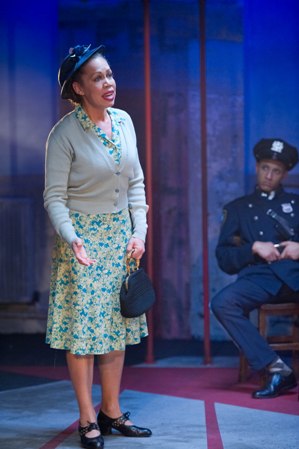The Cradle Will Rock, Arcola Theatre | reviews, news & interviews
The Cradle Will Rock, Arcola Theatre
The Cradle Will Rock, Arcola Theatre
Bags of energy in the old Arcola's swansong, but Blitzstein's piece sucks
Events surrounding the birth of the unrepentantly "un-American" Marc Blitzstein's early (1936-7) shot at socially aware music-theatre prove much more interesting than the show itself. Heck, I got more out of reading the programme than I did sitting through the whole darned thing. Let's face it, Blitzstein's mostly foursquare marriage of words and music sucks. Not that the dynamic Mehmet Ergen's latest Arcola team didn't give it their best shot.
The Cradle Will Rock, you see, has as fascinating a history as its classically trained, pianistically gifted and homosexual creator (and you may indeed have seen, in Tim Robbins's cinematic exploration around its troubled genesis). The Federal Theatre Project took Orson Welles's prospective, and opulent, Broadway premiere under its wing in 1936; but the following year the House Committee on Un-American Activities took the FTP apart. Welles, Blitzstein and their producer found themselves without permission to perform on stage either at the confiscated Maxine Elliott Theatre or elsewhere - so they hired out a 1742 seater on 59th Street, filled it within hours of the move and, with Blitzstein taking on the orchestral role at the piano, had the singer-actors perform it in the auditorium. That must indeed have been a stirring demonstration of "the show must go on", but it may have blurred assessment of the work's actual qualities.
 Naturally, it's a piece anyone who agrees with Blitzstein's campaign against art solely for aesthetes wants to like. Here's the message of Capra movies like It's a Wonderful Life, that masterpiece among many which remains proof against its seasonal recycling: the little people against the corrupted institutions of church, academe, medicine and patron-dependent arts - professional prostitutes, as the drama has it, who make the girl who can't scrape two dimes together look like an amateur. But Capra had great scripts and charismatic stars. There's no shortage of charisma distributed throughout the Arcola's ensemble, and most of its participants are a credit to the solid grounding of our drama schools and their music-theatre courses, starting with Alicia Davies's reluctant tart with plenty of heart (pictured above).
Naturally, it's a piece anyone who agrees with Blitzstein's campaign against art solely for aesthetes wants to like. Here's the message of Capra movies like It's a Wonderful Life, that masterpiece among many which remains proof against its seasonal recycling: the little people against the corrupted institutions of church, academe, medicine and patron-dependent arts - professional prostitutes, as the drama has it, who make the girl who can't scrape two dimes together look like an amateur. But Capra had great scripts and charismatic stars. There's no shortage of charisma distributed throughout the Arcola's ensemble, and most of its participants are a credit to the solid grounding of our drama schools and their music-theatre courses, starting with Alicia Davies's reluctant tart with plenty of heart (pictured above).
Unfortunately it doesn't help that the steel unions' enemies, the ironically named Liberty Committee of villainous, Bunyanly named types, are fat or effete or spinsterly-and-lame stereotypes, however astutely caricatured. And what awkward lines they all have to sing. Was it because Blitzstein thought the man in the street wouldn't grasp Cole Porterish or Gershwinesque sophistication, or couldn't he manage it at this stage in his career? Too often it sounds like the gaucher word-setting of the otherwise superior American-era Kurt Weill. With rhymes like "Germans" with "vermin" and "vernal" with "journal", as well as wince-making stresses - "companeee' and 'journalist", you soon lose the will to engage.
The first half has virtues thinly spread. The spare space, with "Steeltown" minimally evoked in the designs of Lisa Engel and Hannah Penfold, is effectively used. Musical director Bob Broad conjures a huge palette with his tireless assumption of the original Blitzstein role at the piano. The ensemble work is crisp, and a couple of voices stand out, chiefly Davies and the fine baritonal resonances of Adam Linstead as Editor Daily, while others and their accents occasionally falter. But the first finale's vaudeville spat between a compromised painter and musician made me want to run screaming from the theatre, even if it embraces one good gag about debasing the heroics of Beethoven's Egmont Overture with a "yoo-hoo" slogan (interesting, this: it was a performance of Beethoven's Eroica Symphony which Leonard Bernstein dedicated to his friend on learning that Blitzstein had been murdered by sailors on Martinique in 1963).
 Anyhow, I'm glad I didn't leave (and of course, dear readers, for your sakes I wouldn't, would I?). Dramatically, Blitzstein's second-half trump cards of positive good are the virile Foreman to hymn the winds of change that rock the establishment cradle and the indignant sister of a slaughtered innocent posthumously libelled as drunk at his machine. Chris Jenkins has animal stage presence as the former, though I couldn't make out all the words and he'll need to protect his throat if he's going to last the run. Decisively the highlight for everyone, though, was the monologue of Josie Benson's Ella Hammer (pictured left). With crystal-clear modulation worthy of the sublime Audra McDonald, she persuaded us that this was almost on the Brecht-Weill level.
Anyhow, I'm glad I didn't leave (and of course, dear readers, for your sakes I wouldn't, would I?). Dramatically, Blitzstein's second-half trump cards of positive good are the virile Foreman to hymn the winds of change that rock the establishment cradle and the indignant sister of a slaughtered innocent posthumously libelled as drunk at his machine. Chris Jenkins has animal stage presence as the former, though I couldn't make out all the words and he'll need to protect his throat if he's going to last the run. Decisively the highlight for everyone, though, was the monologue of Josie Benson's Ella Hammer (pictured left). With crystal-clear modulation worthy of the sublime Audra McDonald, she persuaded us that this was almost on the Brecht-Weill level.
As the angry finale, with words again lost in the melee, decisively isn't: compare the Act Two climax of The Threepenny Opera, or the ultimate funeral-march of Mahagonny. Me, I'm going to get down off the shelves Blitzstein's operatic adaptation of Lilian Hellman's The Little Foxes, Regina, as a reminder that brighter days lay ahead for this ever-intriguing musical maverick. But I'll certainly miss the Arcola's current home when the company moves its base a little southwards in January. The current building, by the way, has been reclaimed by the owner to turn into luxury flats. That's the paradox of Hackney for you, and it shows that Blitzstein's message, if not the way he says it in The Cradle Will Rock, still speaks to us today.
- The Cradle Will Rock at the Arcola Theatre until 18 December, including two gala performances for the Arcola appeal
- Find out more about the composer on the Marc Blitzstein website

Add comment